Kansas City Representative Patty Lewis bid farewell to the House and her colleagues in the final days of the 2024 session:
Tag: Patty Lewis
House Approves Plan to Reduce Wait Times, Costs for Healthcare
House lawmakers have voted to decrease the time Missourians must wait for some medical procedures, increase quality of and access to healthcare, and decrease costs.
Insurance entities require health care providers to seek prior authorization before performing some procedures before they will agree to cover those procedures. If House Bill 1976 becomes law, health care providers who reach a 90 percent approval rate for a given procedure over a six month period will then not have to seek prior authorization for the following six months.
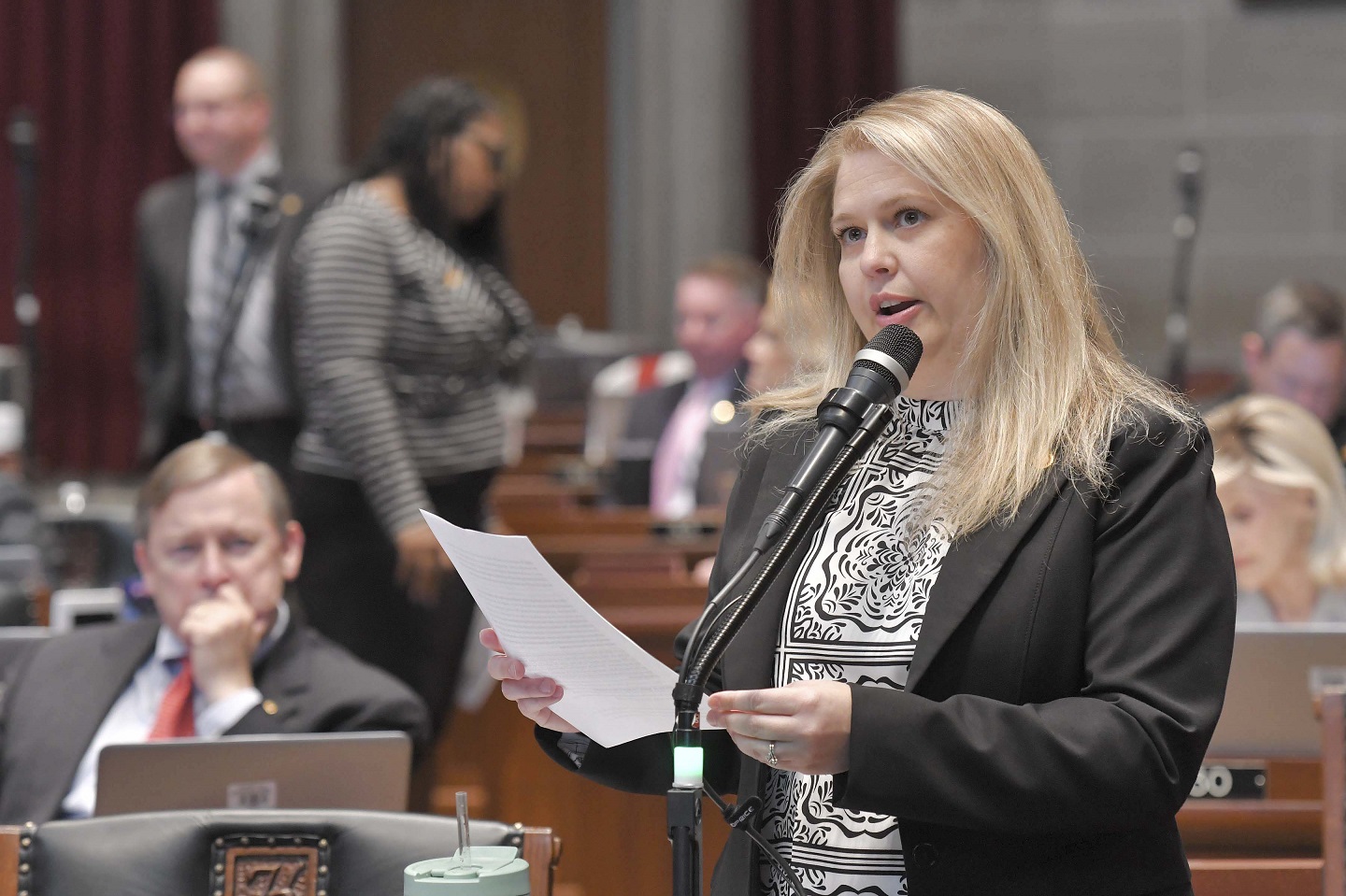
“Insurance companies and their prior authorization standards are getting in the way of health care for everyday Missourians,” said bill sponsor Melanie Stinnett (R-Springfield).
She said the passage of HB 1976 would mean “better access to care for patients and, potentially, decreased cost for patients, because the prior authorization process, itself, increases costs within the healthcare system.”
Stinnett said without knowing it, many patients have likely had a negative experience that involved prior authorization.
“Often, [patients] feel like it is something that the doctor hasn’t done or needs to do, but in reality it’s something that the health insurers lay over on top of what the health care provider has to do,” said Stinnett. “It’s a challenge that the health care provider has to deal with, but often the patient doesn’t realize who’s imposing it or where that’s coming from.”
“As someone who has spent hours and hours and hours trying to get preauthorization for patients that need physical therapy, I cannot support this enough,” St. Louis Representative Jo Doll (D), who has worked as a physical therapist, told her colleagues. “The process is burdensome, it takes hours and hours of – people that are there to provide patient care – takes them away from patients and makes them calling, writing, submitting countless forms to get visits approved.”
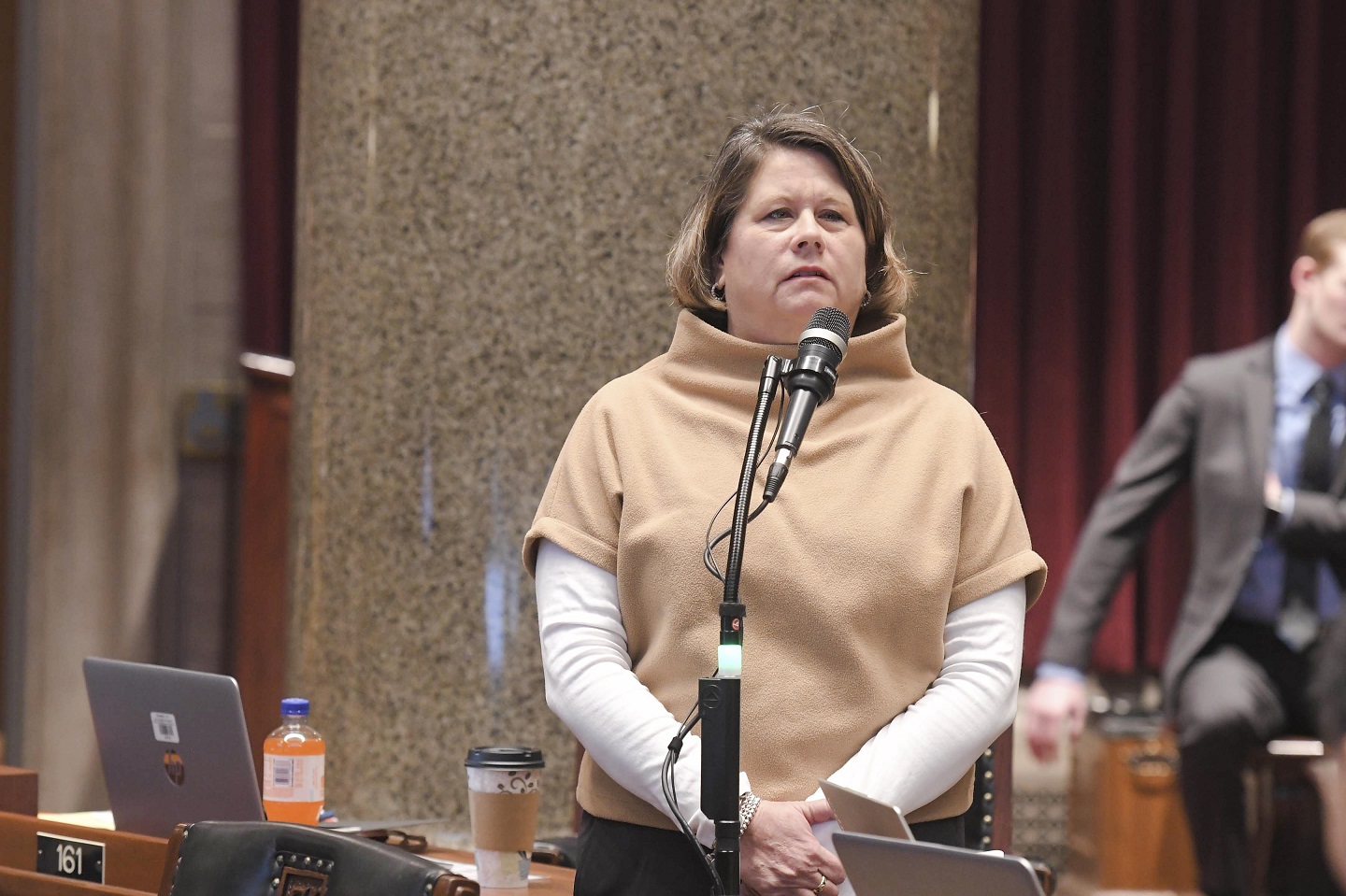
Health care industry workers and those patients who know of the prior authorization process view it as little more than “red tape” that drives up costs and slows care, and Representative Patty Lewis (D-Kansas City) agrees, and said some doctors report that the delays it causes lead to worse outcomes and even deaths.
The legislation made its way to the House after being approved by the Committee on Healthcare Reform. Chairman Kent Haden (R-Mexico) noted that panel gave it a bipartisan, unanimous vote.
“The only people that testified against it were the insurance people and [pharmacy benefit managers],” Haden said. “It is really good for all of our clients, all of our constituents. Not many bills we see effect everybody in the House and all their constituents. This bill will effect virtually everyone and their constituents immediately. It’s a great bill.”
Stinnett told her fellows the prior authorization process gives power to insurance companies and leaves providers fighting to get the best care and outcomes for their patients. Her legislation aims to change that, and to allow providers to focus more on patients’ needs rather than what insurers will allow.
The House voted 146-6 to send that legislation to the Senate.
Bipartisan Array of Bills from 13 House Members would Cut Taxes on Food, Diapers, or Feminine Hygiene Products
Many House lawmakers think Missourians need a break in the taxes they pay to the state. Thirteen House members, nearly evenly split across party lines, have proposed doing so by cutting taxes on necessary products, particularly diapers, feminine hygiene products, and food.
As the legislature enters the final few weeks of its session those bill sponsors are hoping their proposals will get some traction, perhaps as amendments to other proposals, or at least legislative hearings that could spur movement in future years.
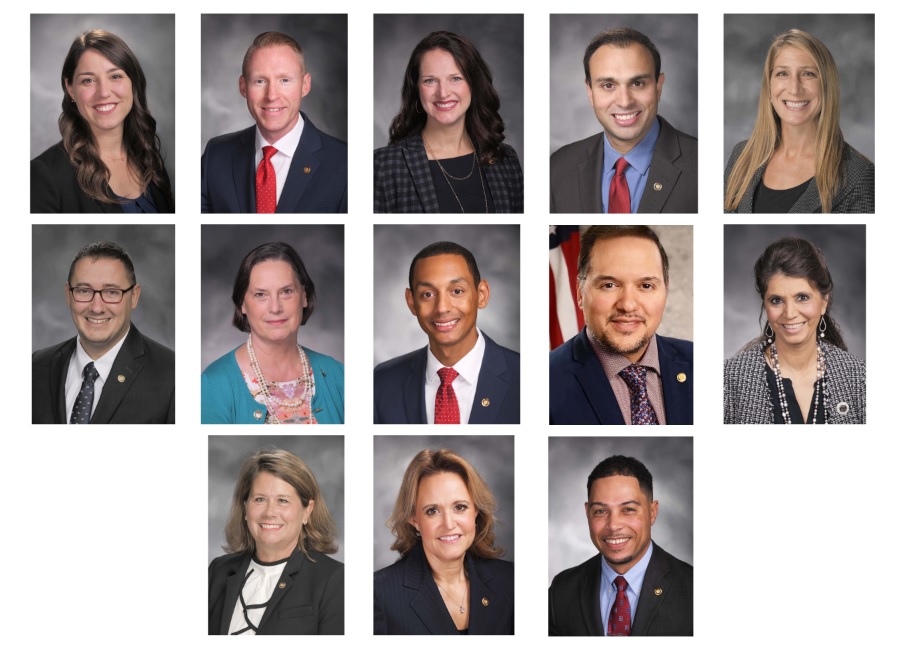
None of these proposals have been referred to committees.
Missouri is one of only 13 states in the nation that taxes food. Three neighboring states do not tax food, and Kansas will join that number next year. St. Charles Republican Adam Schnelting is one of the legislators proposing that Missouri do the same.
Schnelting said as inflation has skyrocketed in recent years, he has hoped that his idea would catch on amount his House colleagues.
“My own family, my daughter is 6 years old, my son is 18 months old, we have a growing family and we feel it in our own pocketbook. I know I’ve got a lot of constituents and a lot of people back home that feel it in their pocketbook. If people in my district have to live within their means then so does the government,” Schnelting said. “My wife and I were spending almost $1,000 a month on food … every little bit helps and adds up. If you’re talking several hundred dollars that can go toward over things, like diapers.”
Lone Jack Republican Chris Sander said in districts such as his, which is near the border with Kansas, Missourians are taking advantage of the lower rates some neighboring states offer.
Robert Sauls (D-Independence) proposes exempting food not only from the state sales tax of 1.225 percent, but also from local sales and use taxes, which in some parts of the state drive the rate up to more than eight percent.
Representative Chris Dinkins (R-Lesterville) said she and other legislators are seeing more and more of their constituents struggling, and they want to help.
“I think we’re always looking at ways to help the citizens of Missouri,” Dinkins said. “When you look at people’s income status, you find that your lowest income people spend the largest percentage of their income on food, so they are the ones that’s most impacted by the sales tax. They spend around 30 percent or more of their income on food, whereas your middle income people only spend a little over 10 percent, so we’re impacting the people that need it the most, and we’re trying to help those that need it the most.”
Missouri taxes diapers and feminine hygiene products at 4.225 percent. Several neighboring states tax those products at a greater rate, but three don’t tax feminine hygiene products at all and one does not tax diapers.
The 4.225 percent rate is often called a “luxury” tax, as it is applied to items that are deemed non-essential. That doesn’t sit well with many lawmakers, including Representative Mark Sharp (D-Kansas City, who proposes taxing such items at the lesser 1.225 percent.
“They should not be taxed at a luxury rate … so reducing them down to a food sales tax, I believe, is the very least that we can do,” said Sharp. “Many states have gone as far as just removing the tax altogether, so we have to something to at least move the needle.”
Others, like Republican Wendy Hausman (St. Peters) want to take the extra step of eliminating the state sales tax on those items, altogether.
Hausman, who is in her second year as a freshman legislator, said the idea was brought to her by fellow members of a businesswomen’s group, Little Black Book.
“We want to make sure that we’re supporting Missouri families by making it easier for them, especially in a day and age where they try to tax you and gouge you everywhere. We need to figure out ways to try to give people and families relief,” said Lake St. Louis Republican Representative Justin Hicks. “We all know that females need feminine hygiene products, that’s a given, and with people having kids out there we all know that diapers are usually a major expense to a family.”
Many legislators and advocates point out that difficulty affording or providing necessary products has a ripple effect, contributing to issues with both mental and physical health.
“From a parent’s perspective, not being able to provide an essential item for their baby [such as diapers] has a mental toll, so it impacts their mental aspect. Also [as] a workforce issue, on average, parents in diaper need miss 5.1 days of work a month because they can’t afford diapers to send to child care with their child, so this is a workforce issue,” said Representative Patty Lewis (D-Kansas City). “Then not to forget the physical health aspect that it has on a baby, sitting in saturated diapers hours after hours. From UTIs to diaper rash, sometimes if they’re not cured with over-the-counter medicine they have to go to the physician or the pediatrician, so additional time off work for the parents and additional cost for the parents as well, and then there can be long-term effects, from renal failure or renal insufficiency, for these babies.”
St. Louis Democrat Barbara Phifer points out, “Period products, especially, are very intimate and personal. If you think about young girls who are going through puberty, and if they don’t have access to those products, their school participation drops dramatically.”
Opposition to these ideas in past years has come from local governments, who say cutting taxes on these products jeopardizes services they provide, such as emergency responders.
“I think that kind of deterred it,” said St. Louis Democrat Jo Doll. “Hopefully this year we can finally get [the tax cut on diapers and feminine hygiene products] across the finish line. I think the biggest problem is that it always gets attached to something and whatever it’s attached to falls apart.”
House Democrat leader Crystal Quade’s (Springfield) plan to cut taxes on food would let Missourians vote on a number of tax changes, including a tax on private planes and yachts, and create a fund in the state’s coffers to help local governments transition.
“Missourians are suffering right now when it comes to making ends meet, and it’s our job to come up with solutions that help everyone,” Quade said. “It’s up to us to figure out ways to make up those losses and that shouldn’t be a burden on the regular taxpayer.”
Representative Maggie Nurrenbern (D-Kansas City), who is in her fourth year on the House Budget Committee, said the state can afford to reduce these taxes.
“We’re looking at record budgets and we have a record surplus still in the state treasury. What can we actually do to pass on cost savings to working families?” said Nurrenbern. “I hate to see a mom standing in the line making that decision, ‘Do I buy this pack of diapers or that gallon of milk,’ and those are the decisions our families are faced with every single day, and it’s time now, to pass that savings on to families and cut the state portion of sales tax on essential items.”
Chesterfield Republican Ben Keathley said the growth in support for these proposed sales tax cuts is a direct response to inflation hikes over the past several years.
While 13 legislators contributed to this article, Keathley said more will get on board the longer such ideas are not passed.
Extension of postpartum coverage for low-income mothers expected to save lives, awaits governor’s action
One of the measures the Missouri legislature approved before its session ended last week could save and improve the lives of mothers and their infants, and get the state out of the basement in state rankings for infant and maternal mortality.
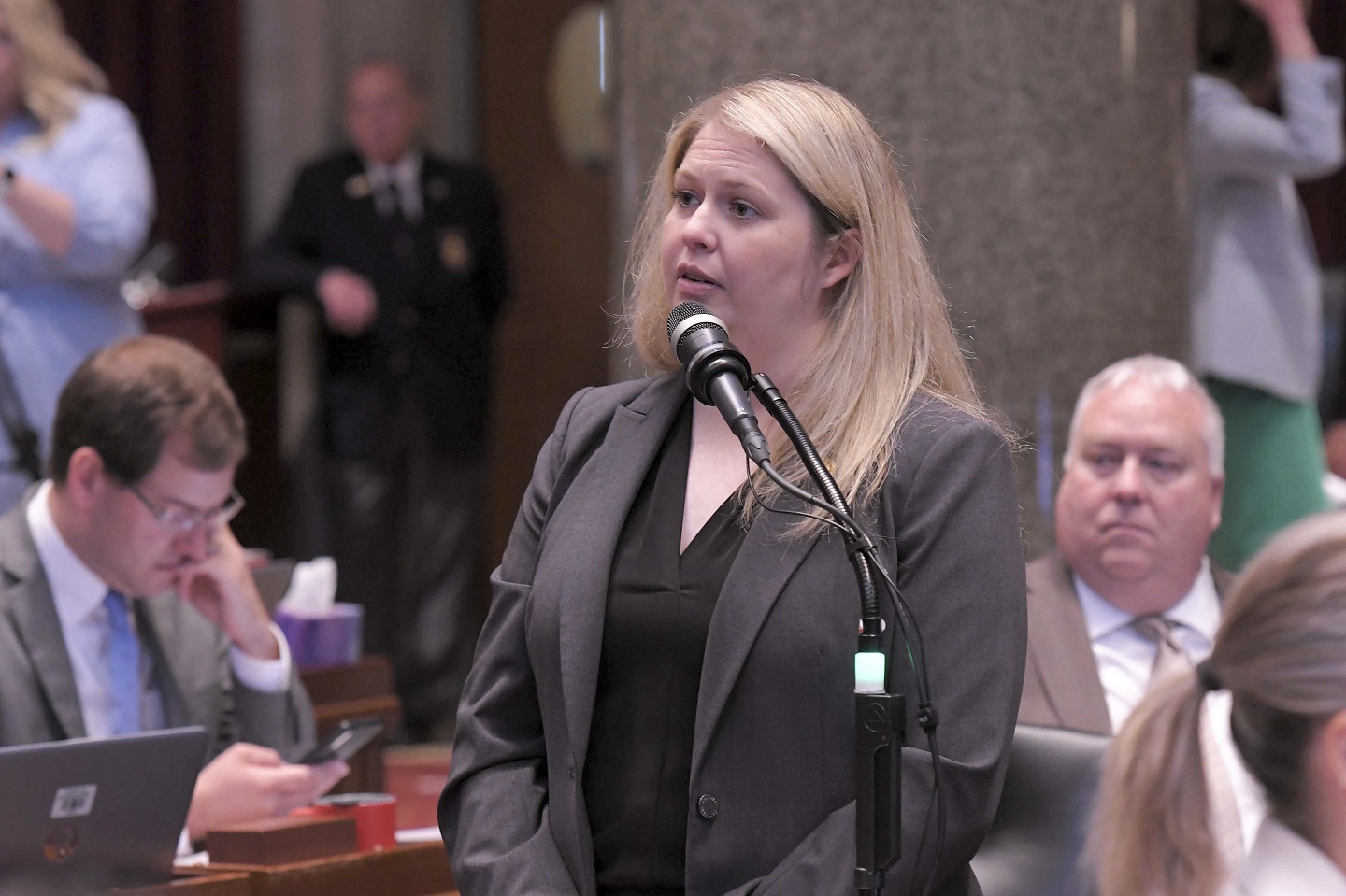
Amendments added to two bills, Senate Bill 106 and Senate Bill 45, would extend MO HealthNet or Show-Me Healthy Babies coverage for low-income pregnant women to a full year after the end of their pregnancy. Currently that coverage stops after 60 days.
At the beginning of the legislative session a bipartisan group of six House members had filed that proposal, with several more having co-sponsored it.
“It takes a team of people that really care about legislation to move it and I’m just proud to be a part of that team,” said Representative Melanie Stinnett (R-Springfield), one of those sponsors.
It was the fourth time Representative LaKeySha Bosley (D-St. Louis) had brought the idea forward, and she said she was ecstatic to see one of “her babies” reach the governor’s desk, and for it to have been part of a truly bipartisan effort.
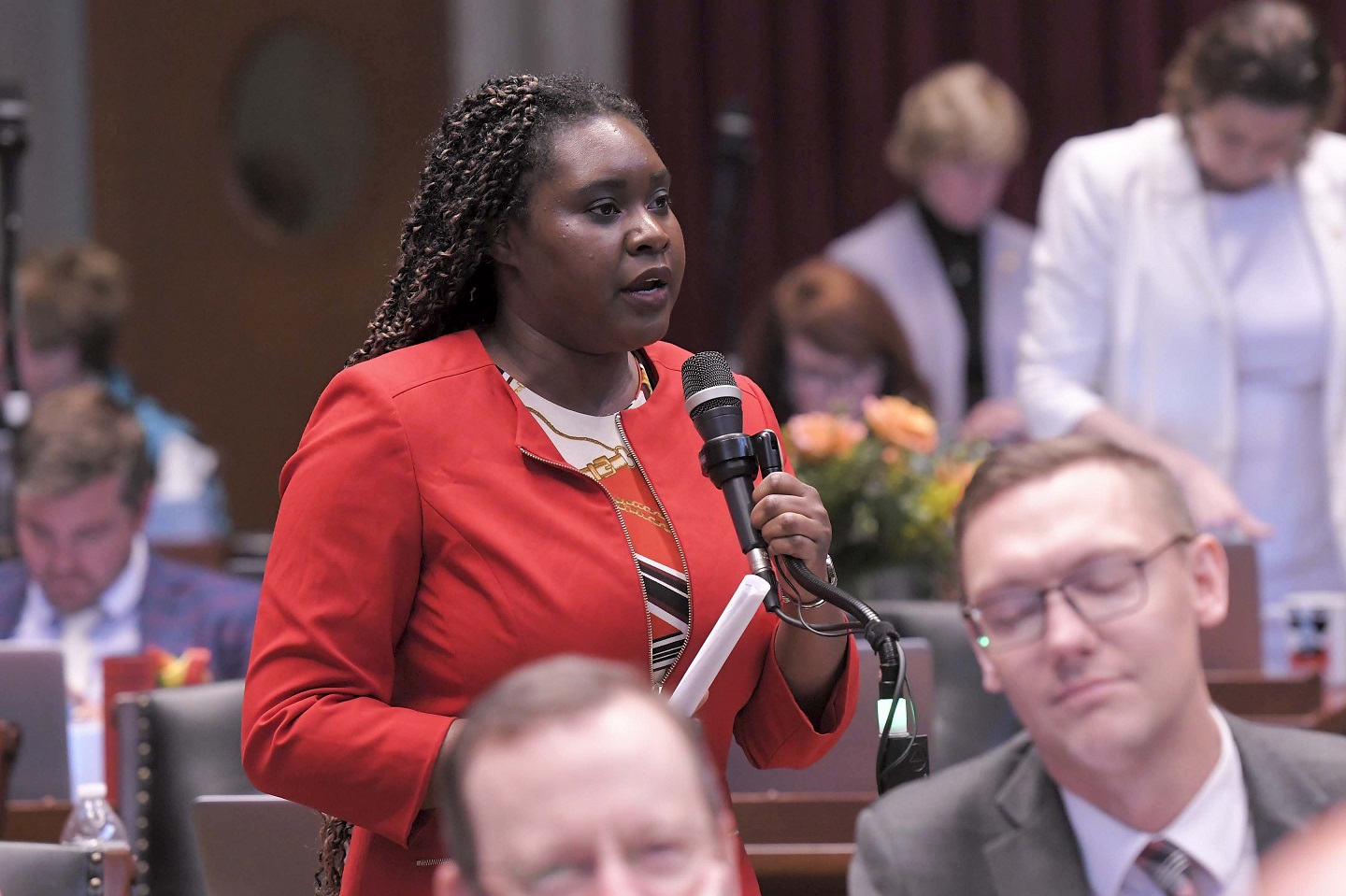
“Everybody was just excited about actually doing something around postpartum that could really make a difference,” said Bosley.
Legislators heard time and time again that a reason to pass this legislation is that Missouri is one of the lowest ranked states in terms of maternal and infant mortality. Representative Patty Lewis’ (D-Kansas City) background includes more than 20 years in nursing. She said this extension will make a huge difference for low-income Missouri mothers, and thereby help Missouri improve that ranking.
Many Republicans point out that the measure is also fiscally conservative. By improving outcomes for mothers, and thereby for their infants, many of them will require less state assistance and will make fewer emergency room visits.
Sedalia Republican Brad Pollitt said, “I didn’t vote for expanded Medicaid but this isn’t an expansion, this is just an extension for a select few who kind of fall through the cracks. I was glad that we were able to give them the opportunity to have this coverage to cut down on the number of deaths, not only in the mothers but also the babies.”
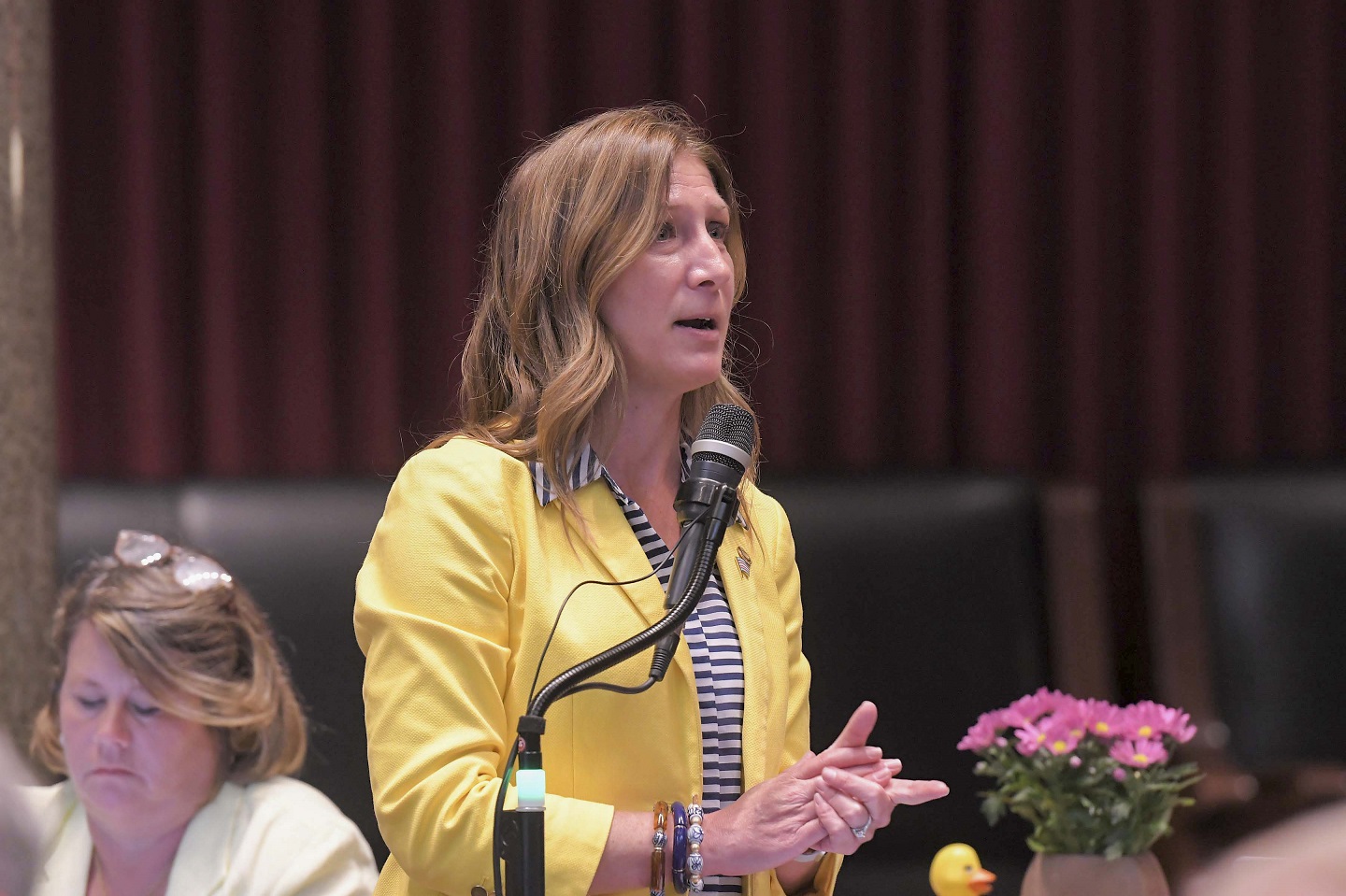
Democrats say the bill was especially important in the wake of last year’s U.S. Supreme Court decision that triggered a law banning most abortions in Missouri.
She noted that some groups in Missouri are impacted more greatly by infant and maternal mortality than others.
Bosley said this additional coverage for mothers and infants impacts an entire family. People often don’t think about what a partner goes through when a mother or infant are sick.
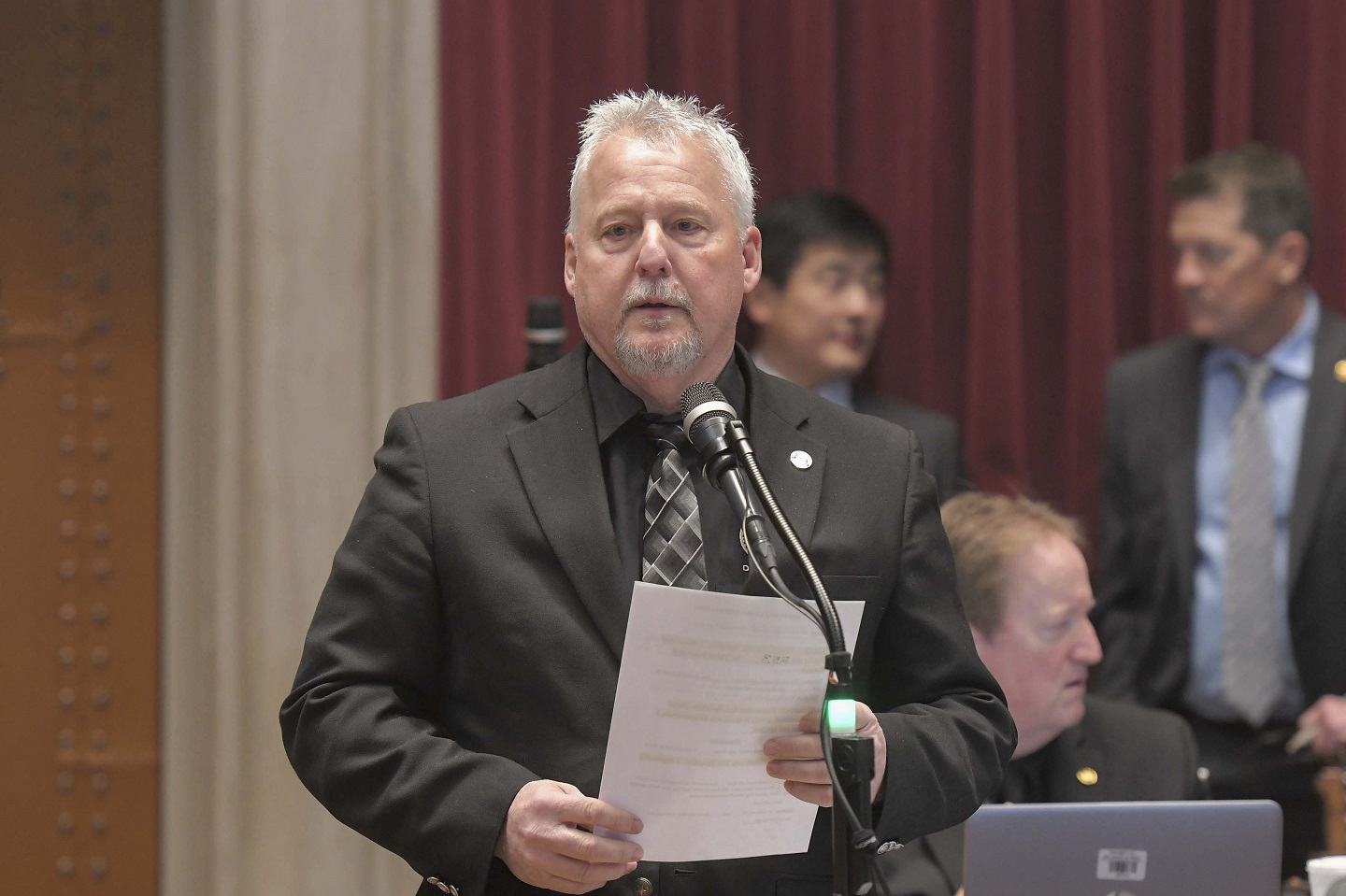
(Photo: Tim Bommel, Missouri House Communications)
Each of these lawmakers spoke to House Communications through huge smiles as they talked about getting this legislation to the governor.
Pollitt added, “It’s a good thing. It’s something we should do. I think it’s a common sense approach.”
This provision would become law immediately upon SB 106 or SB 45 becoming law. Those bills are now awaiting action by Governor Mike Parson (R), who could choose to either sign them into law, allow them to become law without his action, or veto them.
Ban of invasive medical exams without consent sent to governor
The legislature has voted to ensure that Missouri patients can no longer have invasive medical examinations performed while they’re unconscious and without prior knowledge or consent.

Legislators were told that medical students and residents have been allowed and even directed to perform anal, prostate, or pelvic examinations on unconscious patients as part of their instruction, sometimes without those patients’ consent.
House Bill 402 contains several provisions regarding healthcare. One of those would specify that such exams on unconscious patients may only be conducted when that patient or their authorized representative has given consent; the examination is necessary for medical purposes; or when such an exam is necessary to gather evidence of a sexual assault. The legislature voted last week to send HB 402 to Governor Mike Parson (R) for his action.
Representative Hannah Kelly (R-Mountain Grove) sponsored that provision. She told House Communications, “The patient has the right to know what’s going on.”
She said her first concern regarding that issue was for survivors of sexual assault, some of whom she knows personally.
“If you talk to sexual assault survivors, often times they’re very hesitant, especially if they’re younger, to go seek healthcare and to have confidence to get the proper healthcare that they need. This was brought to me out of the concern that we make it abundantly clear in statute that if you’re going to put somebody under anesthesia in regards to any kind of female exam that they have full disclosure of what’s happening before you go under,” said Kelly. “I think anybody likes that, right? But especially if you’re a sexual assault survivor that’s something that is of utmost importance to make sure that you’re getting what you need from your healthcare provider because you’re hesitant, because you’re not secure and you’re not feeling confident of the process.”
The patient examination issue was an important one for legislators in both parties, and as a standalone bill, was voted out of the House 157-0.
Representative Patty Lewis (D-Kansas City) was glad to see it achieve final passage this year.

Lewis noted that this passage shouldn’t hamper students’ abilities to learn. She said they have other chances to receive instruction in such examinations.
Any health care provider who violates the new section of law, or any supervisor of a student or trainee who violates it, would be subject to discipline by their licensing board.
Kelly, meanwhile, encourages Missourians to ask questions of their healthcare providers and to makes sure they are made fully aware of what will happen if and when they are put under anesthesia.
The House voted 120-31 to send HB 402 to Governor Parson, who can now sign it into law, veto it, or allow it to become law without his action.
House votes to bar invasive patient exams without consent
The Missouri House has voted unanimously to end the practice of performing certain invasive medical exams on patients who are unconscious and have not given consent.

Legislators learned that in Missouri and elsewhere, medical students and residents in teaching hospitals are allowed and even instructed to perform anal, prostate, or pelvic exams on unconscious patients as part of their instruction.
“That’s a really bad practice because it’s not a good way of teaching students, but it’s also incredibly traumatic and harmful for that patient, to know that they could have been violated while they were unconscious,” said Matthew Huffman with the Missouri Coalition against Domestic and Sexual Violence.
Representative Hannah Kelly (R-Mountain Grove) agrees and she sponsors House Bill 283, which would require informed consent from the patient or someone authorized to make decisions for them, unless the exam is deemed necessary for diagnostic purposes, or for the collection of evidence when a crime is suspected and the patient cannot give consent for medical reasons. If an exam is performed the patient would have to be notified.
“This bill is aimed at making sure that those who are survivors of trauma don’t have to experience further trauma as they go seek healthcare from their provider,” said Kelly. “I want to make sure that sexual assault survivors can confidently walk into their doctor’s office and know that they are empowered to be in control of the process and that there are no surprises. I have seen firsthand how important that is to strengthen the individual.”
Huffman explained that this issue is particularly important for the people his organization works to protect.
Kelly said she has seen what Huffman is talking about through her daughter, who has given Kelly permission to speak publicly about her experience and encouraged her to pursue related policy.
“She is someone who has dealt with the unfortunate situation of being a victim of sexual assault … we all need healthcare, right? Someone who is a victim of assault, that’s a paramount kind of subconscious concern is, ‘Okay, am I going to be safe? Am I going to be in control of this situation?’”
Both Kelly and Huffman say whether this bill becomes law this year, they hope it will help call attention to what has been happening to some patients and what people can do now. They encourage people to ask questions when visiting a medical practitioner.
“I would hope that an individual who might … feel like they’re not getting full disclosure or they feel like they have questions, I hope he or she will raise their hand and say, ‘I have some questions. What are we going to do here today? There’s not going to be any surprises, right? Walk me through what’s going to happen once I go under anesthesia,” said Kelly. “That’s what I would hope, is that people feel empowered to hold up their hand and say, ‘Hey, make sure that I understand what’s happening here, please.’”
Huffman said what is as important as anything about this proposal, which has come up for several years now but has yet to reach the governor, is that it’s made people aware that these incidents are happening.

Representative Patty Lewis (D-Kansas City) was one of the legislators who expressed the surprise Huffman references, when HB 283 reached the House Floor.
Huffman said what is not known is how often such instances are occurring, largely because they aren’t always reported.
HB 283 was sent to the Senate on a 157-0 vote and awaits action in that chamber. A similar measure has been advancing through the Senate.
Production note: some of Rep. Kelly’s audio was overmodulated and not fit for air, so it is quoted here but not linked.
House members push for lesser tax on feminine hygiene products, diapers
Nine bills filed in the Missouri House would reduce or eliminate the taxes paid on diapers, and most of those would also apply to feminine hygiene products. The bipartisan group of legislators backing them say such a change would help some among the Missourians who most need relief, especially during this period of increased inflation.

The rate at which these products are taxed is sometimes referred to as a “luxury tax.” That is the rate at which most products in Missouri are taxed. Food is taxed at a decreased rate, and some of the proposals would set the levy on those products to that rate. Others would make them exempt from the sales tax altogether.
Several of the bills’ sponsors said there is no reason to keep taxing these things at the greater rate.
“It’s ludicrous … these are not luxury items. These are items that you need to exist and function in society, period,” said Kansas City Democrat Maggie Nurrenbern.
Similar bills have been offered for several years but have fallen short of becoming law. Among their most fervent and consistent backers have been diaper banks. Data released last year by the National Diaper Bank Network placed the annual cost of diapers at nearly $1,000 per infant.
“Over time for the average family, the average parent that’s buying diapers for their child over the course of the first three or four years that will add up,” said Representative Mark Sharp (D-Kansas City) of the tax on those diaper purchases. “The least we can do at the state level is make sure that we’re taking care of the average person, the everyday person who’s just trying to make it and make sure that their child has adequate diapers [and we should] make sure that our older folks have the stuff they need as well.”

Republican Phil Christofanelli (R-St. Peters), sponsoring the proposal for the second straight year, said he thinks part of what has held it up in the past has been that it would significantly reduce revenue, particularly for local governments, “But I think this one’s important, particularly in our time of inflation, where the basic necessities for so many working families are incredibly high and we want to be a culture that encourages stable families and child rearing and a vibrant family culture and this is part of that, make sure that families can afford the necessities of raising kids.”
Representative Peter Merideth (D-St. Louis) has for years sat on the House Budget Committee. He said the state could afford this change.
Merideth’s version of the bill would extend such changes to other necessities, such as, “Toothpaste, deodorant, soap, shampoo, but I do exempt sort of luxury cosmetic-type products. So I think, again, the basic necessities, people just shouldn’t be paying taxes on them.”

In addition to this issue, St. Louis Representative Jo Doll (D) also proposes in House Bill 408 that public charter, middle- and high schools provide feminine hygiene products free to students. She said that wouldn’t just be for students who can’t afford them, it’s about the mental health of young girls dealing with what might still be a new experience.
Regarding those who struggle to afford those products, Doll said, “We know that girls who can’t afford feminine hygiene products don’t go to school during that time and so this would just give them access to products that they may not be able to afford.”

The House sponsors and co-sponsors of those bills include a bipartisan group of 12 Democrats and four Republicans. None of those bills have been referred to a committee.
In the Senate three such measures have been filed. Two of those, filed by Republicans, have been approved by a committee in that chamber.
The bills that have been filed are:
HB 114 (Sharp), HB 126 (Nurrenburn), HB 145 (Doll), HB 290 (Patty Lewis), HB 351 (Christofanelli), HB 381 (Rasheen Aldridge, Jr.), HB 744 (Stephanie Hein), HB 1053 (Barbara Phifer), and HB 1136 (Merideth)
Rep. Doll’s legislation to require schools to provide feminine hygiene products to students at no cost is HB 408.
Bipartisan set of bills would extend post-pregnancy healthcare
A bipartisan group of House lawmakers is sponsoring legislation that they hope will save the lives of women and infants in Missouri, and in doing so, move the state farther from the bottom in the nation in infant and maternal mortality.

Their proposals would extend MO HealthNet or Show-Me Healthy Babies coverage for low-income pregnant women to a full year after the end of their pregnancy. Currently that coverage stops after 60 days.
Six representatives have filed that proposal, including Majority Floor Leader Jonathan Patterson (R-Lees Summit).
He says there are about 5,000 women in Missouri who don’t have insurance coverage either through the state, personal coverage, or an employer.

Governor Mike Parson (R) in his State of the State Address earlier this month said, “we are heartbroken to be failing,” in the area of infant mortality, with Missouri ranking 44th in the nation for its “abnormally high” rate.
Kansas City Democrat Patty Lewis calls the situation, “abysmal.” She said in a Department of Health and Senior Services report covering 2017 to 2019, “Something that was pretty astounding to me based on their findings is 75-percent of the deaths are preventable. As [someone with a] background in nursing, if we can prevent something that’s what I want to do,” said Lewis.
She said in the years covered by the report an average of 61 women died while pregnant or within one year of pregnancy, with 68 in 2018.
Freshman representative Melanie Stinnett (R-Springfield) said maternal healthcare was an issue that voters talked to her about leading up to her election in November.

Representative Brad Pollitt (R-Sedalia) said the data about how many of those deaths could have been prevented weighs heavily on him.
He said the proposal, “is just giving a little extra healthcare to get them off on the right foot and to help the mother who may be having issues and I just think it’s the right thing to do.”
The Republican sponsors of the bill acknowledge that it also relates to their party’s identity regarding its pro-life stance. Bishop Davidson (R-Republic) said his party is often criticized as only supporting life before birth, but this bill is one thing that demonstrates otherwise.
.jpg)
Representative LaKeySha Bosley (D-St. Louis), who is for the fourth time sponsoring this proposal, says that it is “imperative” after Dobbs, “as we did pass the abortion ban, and [even] before we passed House Bill 126, the heartbeat bill, women who were in rural or underserved communities were dying [in] childbirth.”
Patterson agrees with his fellow Republicans, “We’re a pro-life state. I’m very proud to be pro-life, but that also means taking care of these children that are born. This is a measure that would ensure that the mother has healthcare for a year after they’re born, which is critically important to the wellbeing of the newborn baby.”

Bosley notes that while maternal mortality rates are an issue statewide, they hit some in Missouri harder than others.
Bosley is glad that this proposal has gained more sponsors and a lot of media attention and she hopes it will lead to more.
“I’m happy that it’s a hot topic. Let’s go further than just the 12th months. Let’s talk about doulas. Let’s go into the holistic conversation about how we can provide some assistance to doulas and have them be reimbursed,” adding, “Extending the coverage from the three months to the twelve months is just one of the small things that we can do, and it may seem small but it’s going to mean so much to a lot more people across the state.”

Patterson observes that the broad appeal of this plan isn’t limited to the House but extends to the Senate, where two versions have been filed and have already received a hearing. He and the other sponsors share great optimism that this will pass this year.
“It’s just a common sense measure that we can do to ensure the health of the babies.”
None of the House versions of this bill have been referred to a committee.
The bills that have been filed are: House Bill 91 (Patterson), House Bill 254 (Pollitt), House Bill 286 (Lewis), House Bill 328 (Bosley), House Bill 354 (Davidson), and House Bill 965 (Stinnett).
House measure aims to boost suicide awareness and prevention, promote 988 Crisis Lifeline
The Missouri House has taken time in the waning days of the session to pass a bipartisan effort to address suicide awareness and prevention.

It sent to the Senate House Bill 2136, the “Jason Flatt/Avery Reine Cantor Act,” which would require public schools, charter schools, and public higher education institutions that print pupil identification cards to print on those cards the new three-digit number for the National Suicide and Crisis Lifeline, 988.
“988 is going to be our new mental health suicide hotline beginning in July, so this is going to encourage school districts to get that out there to the public so that we can start using that,” explained the bill’s sponsor, Representative Ann Kelley (R-Lamar).
The bill also contains provisions meant to equip and encourage pharmacists to identify possible signs of suicide and respond to them. This includes the “Tricia Leanne Tharp Act,” sponsored by Representative Adam Schwadron (R-St. Charles).
The bill was amended to make sure all pharmacists can participate in that continuing education, regardless of where they work. That change was offered by Representative Patty Lewis (D-Kansas City), who said, “All licensed pharmacists, whether they work inside the four walls of the hospital in an acute care setting or in retail pharmacy [would] have the opportunity to participate in the continuing education to address suicide prevention because there’s such a great need.”
Bolivar representative Mike Stephens (R) is a pharmacist, and said he and others in that profession are well-positioned to be able to identify and work to prevent suicide.

Similar language will allow teachers and principals to count two hours in suicide-related training toward their continuing education.
The bill advanced to the Senate 142-0 after several members spoke about their own experiences regarding suicide.
Festus Republican Cyndi Buchheit-Courtway told her colleagues that every seven hours someone commits suicide in Missouri. It’s the tenth leading cause of death in the state and the second leading cause among those aged 10 to 34.
“When you think about age 10 all the way up to 34 this is covering all of our children in schools and college when they first get out of school and they’re finding their first jobs or meeting someone and becoming a family, and I think that anything that we can do to bring awareness to this issue is just incredible,” said Buchheit-Courtway. “Mental health awareness is so important to so many of us here.”
Representative Dave Griffith (R-Jefferson City) said he knows of a 14 year-old who committed suicide two months ago, just south of the capital city.

“He did it because he was being bullied in school and he felt there was no other way out and he couldn’t talk about it. It became very obvious to that community the need for us to be able to talk and have some kind of tools in our hands to be able to prevent these types of tragic events,” said Griffith. “The suicide prevention hotline number, I believe every school will put it on their cards. There’s no reason for them not to do that.”
Representative Rasheen Aldridge, Junior (D-St. Louis) told the body, “One of my good friends in high school, best friend … who is also between that age that the lady talked about, only in 10th grade, committed suicide … it takes a toll on loved ones, it takes a toll on friends, it takes a toll on people that love that individual and all individuals that have committed suicide.”
The legislation stems partly from the work of the Subcommittee on Mental Health Policy Research, of which Lewis is a member and Buchheit-Courtway is the chairwoman.
The school-related provisions of the bill would take effect in the 2023-24 school year.